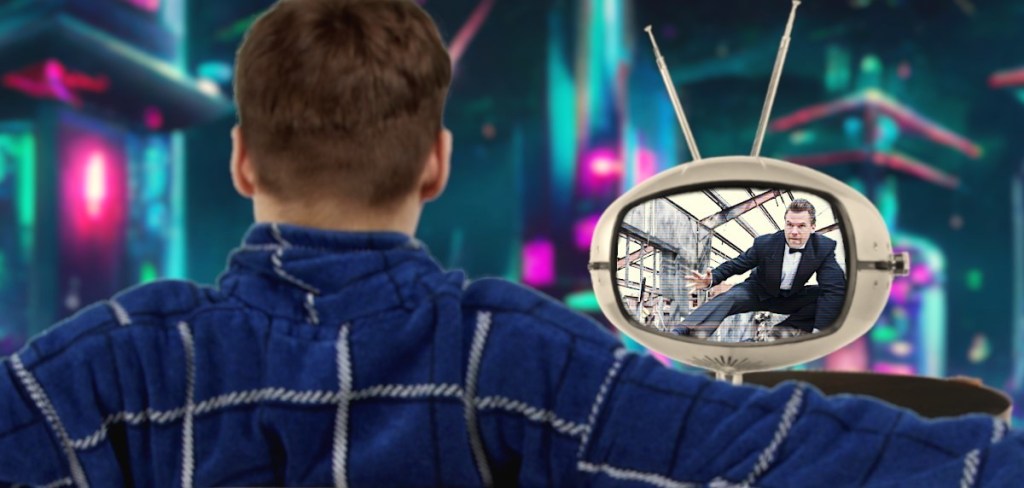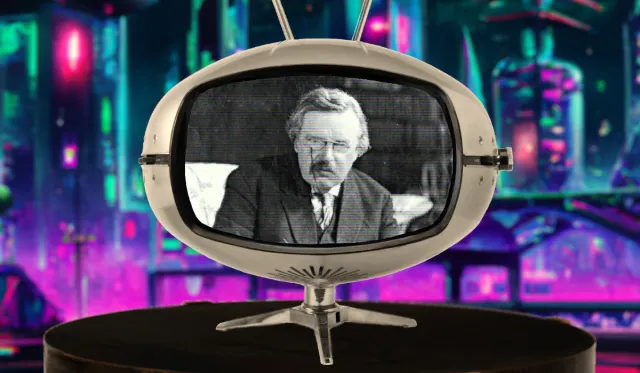From Aleteia -
Fr. Michael Rennier - published on 09/24/23
As I kept losing interest in "prestige" TV shows, I began to ask myself what particular quality I was missing from them. Chesterton showed me the answer.
I’m just going to come out and say this. Sometimes, when you’re a writer, you simply have to grit your teeth and make a blunt statement. Prestige television — the high-toned, sophisticated dramas that win all the awards — is boring.
Not all of it, to be sure, but enough that I started to grow suspicious. Something is wrong with modern storytelling. For instance, that show about big city lawyers bending the law in clever ways while trying to justify the guilt of their moral complicity? I made it about halfway through the series and bailed.
And that show about the science teacher who becomes a drug dealer and slowly becomes corrupted? It was like watching paint dry. Or the anti-hero mobster in Jersey who is ruthless with his enemies but has a conflicted, soft side with his family and talks to his therapist about his feelings of guilt, as if that somehow makes him a sympathetic guy? Not interested.
Does this make me a philistine? Probably. Does it mean I have trouble appreciating modern-day art? Almost certainly. Perhaps the issue is entirely within me. Maybe I’m the one with the defective sensibilities. I prefer turning the television off to re-read Lord of the Rings or stories of the saints or old fairy tales — or even re-watch old sitcoms from the 80s.
For a long time, I would force myself to watch prestige television. After all, so many award committees couldn’t be wrong. But as I watched, I couldn’t help but to lose interest. After this happened enough times, I began to ask myself what it is, what particular quality I was failing to find compelling.
Stories that lead nowhere
G.K. Chesterton, in his book Orthodoxy, suggests the answer. The problem with modern storytelling is that it overwhelmingly focuses on the human ego. Stories now tend be full of anti-heroes, rebels against the system, people with something deeply wrong with them. Most plots go from nowhere to nowhere; no progress is made. The whole point is a psychological deep dive into the allegedly fascinating twists and turns of the human mind, how we morally complicate our decisions before bearing up under the guilt or making ambiguous justifications.

The result of all this interiority is a world in which the anti-hero, the superior or extraordinary person the story focuses on, makes their way through a unique life. There are no dragons to be fought and overcome. There is only endless interior introspection. Each person a hero of their own story. Each hero a suffering Prometheus trying to make meaning in a senseless world.
How to make the world smaller
But, as I tell my parishioners all the time, sin is boring. Moral conflict and self-justification, all the ways we rebel from God and try to take control of our own destinies, rebellion, these things tend to make us feel larger in our own estimation, but they also make the world smaller. To paraphrase Groucho Marx, a world in which my ego is the most fascinating thing is not a world I want to live in.
This is why Chesterton says that the truly exciting stories are those that make us smaller so the world can become larger. If stories aren’t defined by our personal proclivities and willfulness, suddenly the magic enters back into everything. The world becomes an exciting, romantic place. These types of stories are about ordinary people — people like you and me — who encounter an extraordinary universe, who are challenged by it, who genuflect before its beauty, who are in awe of the divine power that created it.
In this way, ordinary people discover grace. We are set upon a heroic journey and discover that something new and extraordinary develops within us.
The extraordinary in the ordinay
Chesterton has quipped that there is nothing so extraordinary in this world than an ordinary man and an ordinary woman and their ordinary children. Modern storytelling misses this entirely.
Ordinary people have a far more exciting time than the heroes you see on TV because that which is strange and odd actually strikes them as strange and odd. They find their surroundings cause for fascination and wonder. As Chesterton says, this is the type of person who realizes that it just might be appropriate to fast 40 days just to hear a blackbird sing.

The truth of fairy tales
Chesterton harks back to an older form of storytelling – fairy tales. “Fairy tales are the entirely reasonable things,” he writes. Compared to them, everything else rings slightly false. Fairy tales seem to be the stuff of dreams but, in fact, they hold even more truth than a history book. They represent the common wisdom of mankind, which is why fairy tales have an enduring quality. Which of us hasn’t gone back and watched the cartoon fairy tale movies we viewed in our youth? Many of us, I suspect, have introduced these tales to our children.
As a parent, I have read my children fairy tales not because I dismiss my children as childish. On the contrary, I read books like The Little Prince to them every night because I take my children very seriously. I’m introducing them to a world full of virtue and challenges, a world in which God is present, a world in which, if they keep at their heroic journey despite the obstacles, they can slay dragons.
There’s a good reason that storytelling that defaults to an anti-hero is boring, but a tale like Lord of the Rings is the most enduring and popular story of our generation. The anti-hero strives for nothing but self-justification. The hobbits are normal people striving for redemption. To me, the latter is far more exciting. Chesterton agrees. So do a lot of other people, it seems.
https://aleteia.org/2023/09/24/g-k-chesterton-on-why-todays-tv-shows-are-so-boring/?utm_campaign=EM-EN-Newsletter-Daily-&utm_content=Newsletter&utm_medium=email&utm_source=sendgrid&utm_term=20230925


